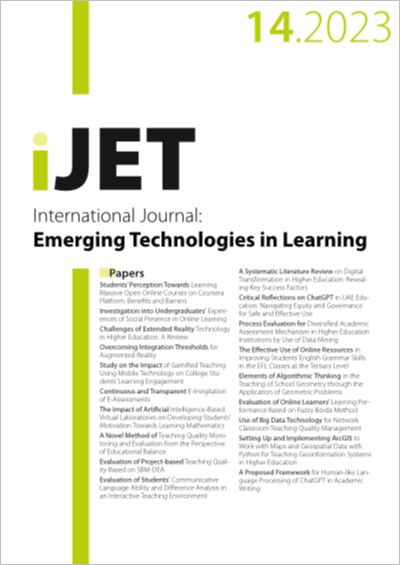Critical Reflections on ChatGPT in UAE Education: Navigating Equity and Governance for Safe and Effective Use
DOI:
https://doi.org/10.3991/ijet.v18i14.40935Keywords:
ChatGPT, Equity, Governance, Education, Emerging TechnologyAbstract
Purpose: This study aims to critically review the new AI-based tool ChatGPT in UAE education and evaluate its impact on students and their learning. The study maintains a specific focus on the issues of equity and governance to allow educators in UAE to ensure that the AI-based tool is used ethically, and safely and does not restrict students’ academic development. Design/methodology/approach: This paper is a conceptual paper presenting the critical reflection of authors working in the Emirates College of Advanced Education in UAE (Author 1: Dr. Othman Abu Khurma, Author 2: Dr. Nagla Ali, and Author 3: Dr. Reem Hashem). Consequently, the study reflects the authors’ evaluation of the issues of equity and governance that maximize the potential benefit of how ChatGPT is used by students in UAE schools and higher education institutions and their thoughts on how it might be improved. Findings: The findings of this study indicate that there are both benefits and drawbacks associated with the use of ChatGPT. The authors made some recommendations to the educators in UAE regarding the ethical and fair use of ChatGPT which does not hinder student learning. Practical implications: The findings of this reflective study can raise educators’ and policymakers’ awareness regarding the potential risks and benefits of the use of ChatGPT by students. Moreover, the study offers guidance to educators and policymakers in UAE to ensure ethical and effective learning and the safe adoption of this and similar AI-tools by students. Originality/value: The study is a critical reflection of the equity and governance issue related to the use of ChatGPT by students and offers new practical insights regarding how ChatGPT can be adopted safely by students in UAE. The reflection is based on a conceptual analysis of authors’ personal and professional experiences and test usage and is thus different from previous studies.
Downloads
Published
How to Cite
Issue
Section
License
Copyright (c) 2023 Othman Abu Khurma, Nagla Ali, Reem Hashem

This work is licensed under a Creative Commons Attribution 4.0 International License.



